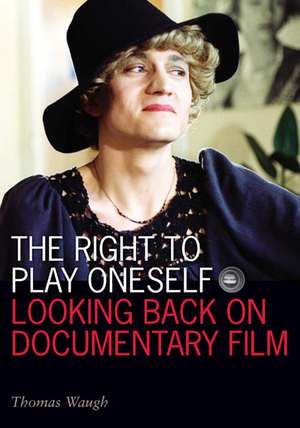The Right to Play Oneself: Looking Back on Documentary Film: Visible Evidence
Autor Thomas Waughen Limba Engleză Paperback – 12 mai 2011
The Right to Play Oneself collects for the first time Thomas Waugh’s essays on the politics, history, and aesthetics of documentary film, written between 1974 and 2008. The title, inspired by Walter Benjamin’s and Joris Ivens’s manifestos of “committed” documentary from the 19 0s, reflects the book’s theme of the political potential of documentary for representing the democratic performance of citizens and artists.
Waugh analyzes an eclectic international selection of films and issues from the 1920s to the present day. The essays provide a transcultural focus, moving from documentaries of the industrialized societies of North America and Europe to those of 1980s India and addressing such canonical directors as Dziga Vertov, Emile de Antonio, Barbara Hammer, Rosa von Praunheim, and Anand Patwardhan. Woven through the volume is the relationship of the documentary with the history of the Left, including discussions of LGBT documentary pioneers and the firebrand collectives that changed the history of documentary, such as Challenge for Change and ACT UP’s Women’s Collective.
Together with the introduction by the author, Waugh’s essays advance a defiantly and persuasively personal point of view on the history and significance of documentary film.
Preț: 226.60 lei
Nou
Puncte Express: 340
Preț estimativ în valută:
43.36€ • 45.36$ • 36.02£
43.36€ • 45.36$ • 36.02£
Carte tipărită la comandă
Livrare economică 02-16 aprilie
Preluare comenzi: 021 569.72.76
Specificații
ISBN-13: 9780816645879
ISBN-10: 0816645876
Pagini: 352
Ilustrații: 46
Dimensiuni: 178 x 254 x 20 mm
Greutate: 0.56 kg
Ediția:1
Editura: University of Minnesota Press
Colecția Univ Of Minnesota Press
Seria Visible Evidence
ISBN-10: 0816645876
Pagini: 352
Ilustrații: 46
Dimensiuni: 178 x 254 x 20 mm
Greutate: 0.56 kg
Ediția:1
Editura: University of Minnesota Press
Colecția Univ Of Minnesota Press
Seria Visible Evidence
Notă biografică
Thomas Waugh is professor of film studies at Concordia University, Montreal.
Cuprins
Preface: Of Pulses, Panaceas, and Parallel Universes
Acknowledgments
1. Why Documentary Filmmakers Keep Trying to Change the World, or Why People Changing the World Keep Making Documentaries (1984)
2. Dziga Vertov, 1930s Populism, and Three Songs of Lenin (1975)
3. Bread, Water, Blood, Rifles, Planes: Documentary Imagery of the Spanish Civil War from the North American Popular Front (1990)
4. Acting to Play Oneself: Performance in Documentary (1990)
5. Beyond Vérité: Emile de Antonio (1977)
6. Sufficient Virtue, Necessary Artistry: The Shifting Challenges of Revolutionary Documentary History (2006–2008)
7. Lesbian and Gay Documentary: Minority Self-Imaging, Oppositional Film Practice, and the Question of Image Ethics (1984)
8. Walking on Tippy Toes: Lesbian and Gay Liberation Documentary of the Post-Stonewall Period (1997)
9. “Words of Command”: Cultural and Political Inflections of Direct Cinema in Indian Independent Documentary (1990)
10. Joris Ivens and the Legacy of Committed Documentary (1999)
Notes
Filmography
Bibliography
Publication History
Index
Acknowledgments
1. Why Documentary Filmmakers Keep Trying to Change the World, or Why People Changing the World Keep Making Documentaries (1984)
2. Dziga Vertov, 1930s Populism, and Three Songs of Lenin (1975)
3. Bread, Water, Blood, Rifles, Planes: Documentary Imagery of the Spanish Civil War from the North American Popular Front (1990)
4. Acting to Play Oneself: Performance in Documentary (1990)
5. Beyond Vérité: Emile de Antonio (1977)
6. Sufficient Virtue, Necessary Artistry: The Shifting Challenges of Revolutionary Documentary History (2006–2008)
7. Lesbian and Gay Documentary: Minority Self-Imaging, Oppositional Film Practice, and the Question of Image Ethics (1984)
8. Walking on Tippy Toes: Lesbian and Gay Liberation Documentary of the Post-Stonewall Period (1997)
9. “Words of Command”: Cultural and Political Inflections of Direct Cinema in Indian Independent Documentary (1990)
10. Joris Ivens and the Legacy of Committed Documentary (1999)
Notes
Filmography
Bibliography
Publication History
Index
Recenzii
"For decades now, Thomas Waugh has worked at the forefront of documentary media studies. This collection of his essays on documentary shows his international range, rigorous historical analysis, commitment to media as an active force for political enlightenment and change, and hallmark wit in full force. Waugh provides a crucial foundation for discerning what’s at stake in the evolving world of documentary media." —Chuck Kleinhans, coeditor of JUMP CUT: A Review of Contemporary Media
"There is no one quite like Thomas Waugh. As this glorious collection shows, while always alert and responsive to changes in documentary and attitudes towards documentary, he has more than thirty-five years remained true. He is committed to commitment. With his wit, lightly worn self-awareness, and wonderfully uncloying sense of caring, he lets us too see and hear why documentary—and the world—matters." —Richard Dyer, author of The Matter of Images: Essays on Representations
Descriere
Discussions of “committed” documentary by a “committed” historian of film.















